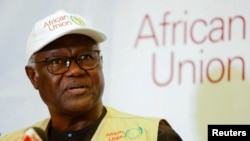There are concerns Koroma's indictment could stoke tension brought by a contentious election in which President Julius Maada Bio was reelected for a second term in June 2023. The main opposition candidate rejected the results and international partners questioned the vote.
Months later, on November 26, gunmen attacked military barracks, a prison and other locations in Sierra Leone, freeing about 2,200 inmates and killing more than 20 people. The government said afterwards that it was a foiled coup led mostly by Koroma's bodyguards. They summoned the ex-president for questioning at the start of December.
Koroma condemned the attacks shortly after they happened. His lawyers have called the charges "trumped up" and part of a "political vendetta."
The magistrate overseeing the case on Wednesday ruled in favor of Koroma's lawyers, who had asked the high court to grant Koroma a trip abroad for medical reasons. The ex-president will be allowed to travel to Nigeria for no more than three months, the magistrate said before adjourning the case to March 6.
Sierra Leone's attorney general declined to comment.
Koroma was not in court on Wednesday, a Reuters reporter said. He was granted bail when the court indicted him on January 3 and has since been confined to his home in the capital Freetown. Nigeria had previously offered to host him on a temporary basis, which he had accepted, according to a letterfrom West Africa's main regional bloc, the Economic Community of West African States, seen by Reuters.
According to Sierra Leone's penal code, a person found guilty of treason could face imprisonment for life. Twelve other people also have been charged with treason in connection with the failed coup, including ex-police and correctional officers and a member of Koroma's security detail.













Forum